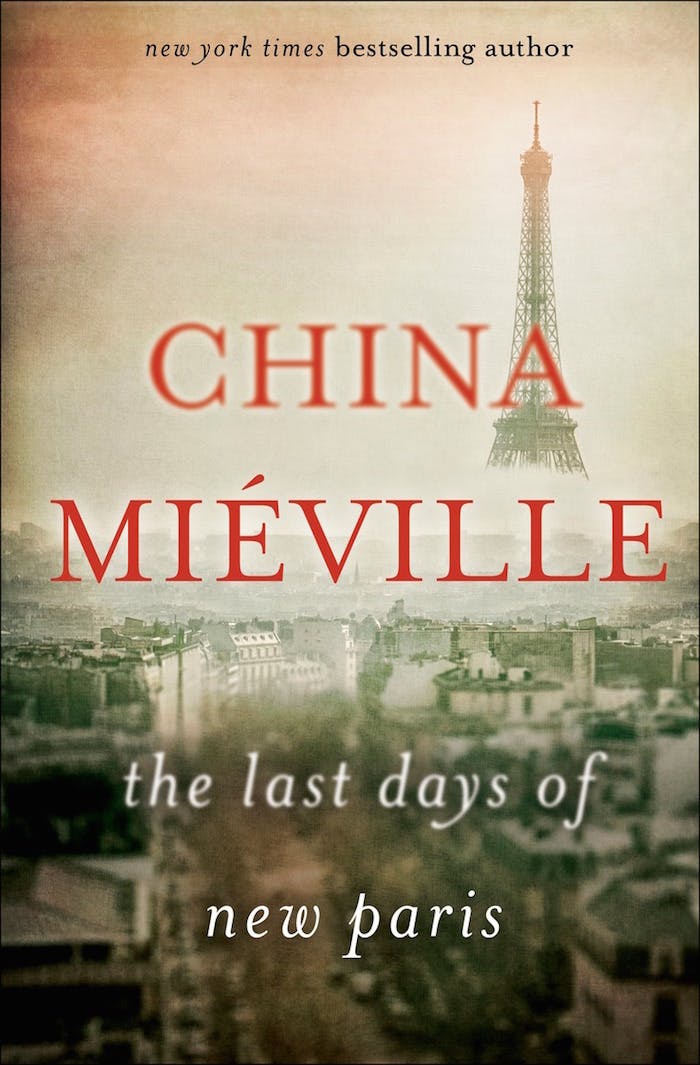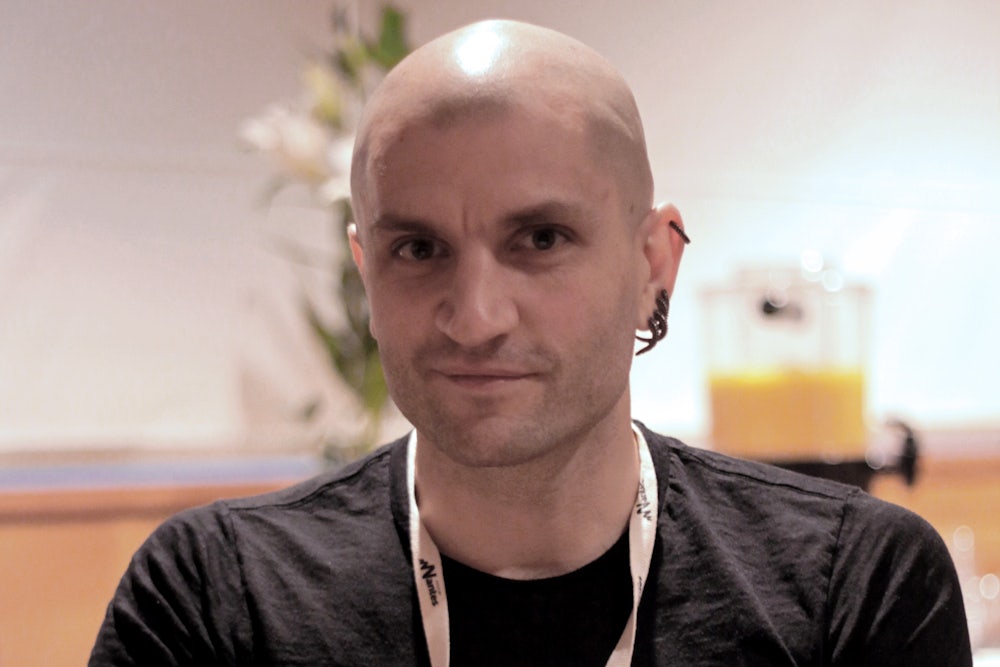“Speculative fiction” refers to a range of different genres, from horror to fantasy to sci-fi. It’s a respectful and precise way to talk about traditionally scorned stories, one that contrasts with “realism” rather than “literature.” Unfortunately the phrase “speculative fiction” sounds nerdy and pedantic, like a term created to correct people who don’t know already about it. Isn’t all fiction speculative?

The British writer China Miéville doesn’t embrace the label “speculative” in particular—he prefers “weird”—but his politicized fantasy stories fit the bill. What if a cult resurrected a giant squid from the Natural History Museum? (Kraken) What if there were a giant iceberg floating in the sky above London? (“Polynia”) What if two cities existed in the same place but refused to acknowledge each other? (The City and The City) For his new novella The Last Days of New Paris, Miéville poses a question that’s just as strange: What if, during World War II, the surrealists had joined the fight?
The book’s hero is Thibaut, a young urban guerrilla fighting for the Resistance in occupied Paris. If you know Miéville’s work, you might guess that Thibaut is a committed Trotskyist (rather than part of the liberal Free French forces), but his affiliation is more specific. Our protagonist is a member of the Main à Plume—an armed cadre of surrealists who fight the Nazis with art. The group takes its name from a real surrealist journal published under the occupation, some of whose contributors, including Gérard de Sède and Noel Arnaud did help the Resistance. But in New Paris, art is not a metaphorical weapon.
The city emerges from an explosion. In 1941 (nine years before we’re introduced to Thibaut), an acolyte of occultist Aleister Crowley has captured in a spirit battery the energy from a surrealist bull session led by Andre Breton himself. The power contained therein explodes (the “S-bomb”) at the famous cafe Les Deux Magots, manifesting art images into reality and opening a rupture with Hell at the same time. Now (1950), these art “manifs” wander the streets like large dangerous beasts. The members of Main à Plume feel an affinity with the manifs, and they use their surrealist magic (and guns) to resist the occupation government. And, via their new diabolic Christian church, the Nazis have enlisted giant demons, who are ferocious but mostly just want to go home. All these forces collide in the what-if capital.
The Last Days of New Paris is a short book at under 200 pages. Whereas the conventions of literary fiction might have compelled Miéville to make the story about the Thibaut’s personal growth, in speculative fiction characters are often asked to take extraordinary action in order to keep their messed-up world the same. The Resistance isn’t the only group trying to harness the manifs; Nazi attempts to summon futurist artwork to its intended fascist ends have failed, but the devil church is working on something. Fighting off Nazi table-wolves (literal tables crossed with wolves), Thibaut runs into Sam, who is a reporter, or an American spy, or something else entirely. Regardless, she doesn’t like Nazis and seems to have some idea of what’s really going on, so she and Thibaut team up (along with an unwieldy Nazi-killing surrealist manif) to keep Hitler from shifting the balance of power once and for all.
Miéville is at his best when he’s imagining things like the politics behind the rise of the diabolical Nazi church. The book hums when he’s managing a handful of huge variables at the same time. Speculation piles upon speculation until a Nazi demon is battling a communist art monster. But if you can’t juggle religion, politics, war, history, and art, then you might as well write contemporary realist novels. Among all Miéville’s themes, its political sophistication that undergirds his whole project.
Where a lesser author might imagine Thibaut as an embittered loner, who follows only his needs and his conscience, Miéville navigates his protagonist’s complicated affiliations deftly. Thibaut is an outcast even within the anti-Nazi forces, but it’s because he’s committed to something bigger than himself (surrealist magic and Trotskyism) not because he’s constitutionally rebellious. Miéville doesn’t make the political elements laborious. Instead the ideologies and warring affiliations are the basis for the author’s worldmaking. The city’s religious, aesthetic, and political lines of conflict are his setting, but they also develop like characters, probably more than the actual characters do. Even Hell has policy positions and red lines. In New Paris, beliefs are about more than having opinions or justifying behavior. Beliefs are made flesh, in the persons of Thibaut and Sam, and in the manifs.
“What if there were a force in the world that could see, compare, and validate our true abilities, potentials, and characters?” is a common speculation in speculative fiction. Doesn’t it seem wrong that something as enduring as our self should be defined according to other people’s judgements about our ephemeral choices and actions? Better to ask the Hogwarts Sorting Hat or a Scientology E-meter. The desire to be known or measured in an objective way can explain parts of a lot of different real-world speculative fiction behaviors, from personality quizzes to horoscopes to DNA ancestry tests. But for a left-wing author like Miéville, it makes for uneasy synthesis. Is the surrealist magic who Thibault is or what he does?
In real life, mid-century surrealism and Marxism didn’t fit together the way they do in Thibault and his comrades, at least not for many people. Devotion to radical aesthetics didn’t translate to commitment to radical politics the way it does in Miéville’s world. Although both ideologies found themselves in conflict with fascism and shared a certain rebellious appeal, the two currents never quite meshed. Albert Camus didn’t think much of surrealists or Marxists, and he watched the “frenetic” artists—who wanted “‘any sort of revolution,’ no matter what as long as it rescued them from the world of shopkeepers and compromise in which they were forced to live”—with disdain as they tried to reconcile themselves to collective politics.
Camus’s humanism didn’t have room for Breton’s joking tongue-in-cheek nihilism or Marx’s deadly serious historical thinking, but he did have certain insights about their incompatibility. “Revolution, for the surrealists, was not an end to be realized day by day, in action, but an absolute and consolatory myth,” he writes in The Rebel, “They wanted the ‘communism of genius,’ not the other form of Communism. These peculiar Marxists declared themselves in rebellion against history and extolled the heroic individual.” Miéville squares the circle by killing Thibault’s comrades and leaving him alone to defend the neighborhood, but what kind of Marxist can a lone ranger be?
Combat is one place where the day-to-day of revolution and the absolute and consolatory myth collide, where dramatic life-and-death action is what the situation requires—especially in speculative fiction war, where the grinding of massive armies plays second fiddle to magical paradigm-shifting weapons. Miéville is too smart to make manifs good and devils bad—both are more like large animals—but genre conventions can have a tricky influence. Luke Skywalker with a little red book in his tunic is still a princeling in exile whose individual galactic importance is legitimized by his royal blood. Thibault isn’t a lot more complex, and his comrade Sam isn’t much of a twist on the sassy femme fatale with a secret.
As a formulaic romp, The Last Days of New Paris is fun and smart. While other authors tack on their characters’ political ideologies, Miéville makes them matter. But by manifesting the concepts, he picks up a greater burden. Sometimes the ideas threaten to burst the seams on the form. To bring them into harmony might require a different order of speculation.
